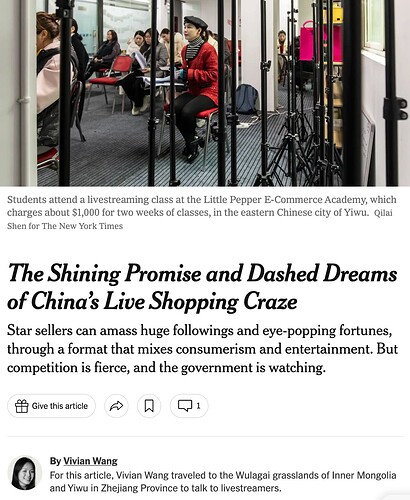-
Taiping是一个中国的现场直播销售员,他在中国北方草原中间的蒙古包里工作。他向成千上万的观众销售牛肉干,并与他们进行实时互动,介绍蒙古风干技术,回答问题,并提供独家交易。在四个小时的会议结束时,他已经赚取了约15,000美元。
-
这种直播形式几年前在中国出现,在冠状病毒大流行期间变得越来越受欢迎。在中国的10亿网民中,有近一半的人尝试过这种方式,一些最著名的流媒体人已经成为名人。他们兜售从化妆品到微波炉的一切,通过娱乐和个人轶事赢得观众的信任。
-
直播行业发展迅速,全球品牌向有影响力的人支付费用,让他们直播自己的产品。然而,市场竞争越来越激烈,更广泛的经济放缓导致了流媒体平台背后的公司裁员。尽管如此,许多人,包括农民、工厂工人和退休人员,都加入了这股热潮,其中一些人,如太平,变得非常成功。
-
中国政府担心这个行业发展过快过大,发布了大量不断变化的法规。名人主持人突然从人们的视野中消失了。
-
那么,直播电子商务的故事,不仅是关于一种新的购物形式的崛起。它是一个窗口,可以看到在今天的中国做生意的机会和危险,因为中国政府寻求对私营企业的更大控制。
-
"研究中国电子商务的新罕布什尔大学媒体研究教授张琳说:"中国的经济非常发达;它有双重目标,一是促进发展,这对他们来说是一个巨大的需要,二是保持稳定。“有时候,这种矛盾对他们来说是不可能解决的。”
-
太平,一个来自内蒙古的前牧民和卡车司机,当他注意到游客到他的镇上参观时,他借钱制作并销售牛肉干。
-
一位朋友向他介绍了快手,这是一个短视频平台,然后引入了现场直播。
-
太平看到了利用直播推广和销售他的牛肉干的潜力,并接受了快手的培训来帮助他这样做。
-
瓜帅试图通过鼓励他们销售产品来清理流媒体的内容,而太平被选为这个新方向的一部分。
-
他接受了公共演讲、员工管理和商标注册方面的速成课程,他的旅程得到了快手的推动。
-
他获得了自信,并利用有限的教育来打趣自己,同时在2018年仍然销售了价值65万美元的牛肉干。
-
这场大流行帮助推动了网上购物,导致瓜州的电子商务销售蓬勃发展,并实现了54亿美元的IPO。
-
太平的业务也飞速发展,他现在有10名客服人员和3个商标。
-
他在他的草原蒙古包或他的实体店中流连忘返,在屏幕上为顾客穿着传统服装,但下班时却穿着菲拉运动套装。
-
义乌是中国的一个制造中心,拥有自己的学院、培训学院和多家专门管理流媒体的公司。
-
市政府为高收入的有影响力的人提供奖励,例如为他们的孩子安排最好的学校。
-
王铁彪是一位来自山东省的55岁有抱负的流媒体人,他来到义乌,利用所提供的免费培训。
-
王铁彪必须在众多的流媒体人中脱颖而出,学习一些口头禅和基本的技术技能,以实现销售。
-
流媒体人现在抱怨说,应用程序只推广那些为流量付费的账户,而大机构则在广告上大手笔。
-
尽管竞争激烈,王志强还是决心继续尝试,希望有机会获得成功。
-
王某认为直播是一个赚取超过几千美元的机会,与在工厂工作不同。
-
他认为有一些成功的秘诀是他还不知道的。
-
王某仍希望自己能在义乌做直播,并希望能在义乌的直播平台上取得成功。
-
由于政府的审查,直播的成功可能迅速消失
-
对不当行为的投诉和不明确的规则促使政府发布越来越详细的限制措施
-
限制措施由人类审查员和人工智能执行,惩罚措施从10分钟的暂停到永久禁止不等。
-
维亚因偷税漏税被删除
-
政府希望直播者遵守道德和政治标准
-
规则有可能削弱直播购物的核心吸引力
-
随着政府承诺重振经济,新法规的步伐已经放缓
-
直播在美国的发展举步维艰
-
该业务在中国的前景并不确定
-
Taiping is a Chinese livestreaming salesman who works from a yurt in the middle of a northern Chinese grassland. He sells beef jerky to thousands of viewers and interacts with them in real-time, describing Mongolian air-drying techniques, answering questions, and offering exclusive deals. By the end of his four-hour session, he has earned around $15,000.
-
The livestreaming format emerged in China several years ago and has become increasingly popular during the coronavirus pandemic. Nearly half of China’s one billion internet users have tried it, and some of the most famous streamers have become celebrities. They hawk everything from makeup to microwaves, earning the trust of viewers through entertainment and personal anecdotes.
-
The livestreaming industry has grown rapidly, with global brands paying influencers to stream their products. However, the market has become increasingly competitive, and the broader economic slowdown has led to layoffs at the companies behind the streaming platforms. Despite this, many people, including farmers, factory workers, and retirees, have joined the frenzy, with some, like Taiping, becoming highly successful.
-
Livestreaming e-commerce is growing quickly in China
-
Chinese government has issued a flood of ever-evolving regulations
-
Celebrity hosts have abruptly disappeared from view
-
Story of livestreaming e-commerce is not only about the rise of a new form of shopping, but also a window into the opportunities and perils of doing business in China
-
Chinese state is caught up in the economy, with a dual goal of boosting development and maintaining stability
-
Tension between these goals is often impossible to resolve
-
Media studies professor Lin Zhang has studied Chinese e-commerce
-
Taiping, a former herdsman and truck driver from Inner Mongolia, borrowed money to make and sell beef jerky when he noticed tourists visiting his town.
-
A friend introduced him to Kuaishou, a short video platform which then introduced livestreaming.
-
Taiping saw the potential to use livestreaming to promote and sell his jerky and received training from Kuaishou to help him do so.
-
Kuaishou sought to clean up content from streamers by encouraging them to sell products, and Taiping was selected to be part of this new direction.
-
He received a crash course in public speaking, employee management, and trademark registration and his journey was promoted by Kuaishou.
-
He gained confidence and used his limited education to poke fun at himself, while still selling $650,000 worth of jerky in 2018.
-
The pandemic helped to turbocharge online shopping, leading to a boom in Kuaishou’s e-commerce sales and a $5.4 billion IPO.
-
Taiping’s business also soared, and he now has 10 customer-service employees and 3 trademarks.
-
He streams from his grassland yurt or his brick-and-mortar store and wears traditional clothing onscreen for customers, but off duty wears Fila athletic suits.
-
Yiwu is a manufacturing hub in China with its own college, training academies, and multiple companies dedicated to managing streamers.
-
The city government offers incentives to high-earning influencers, such as prime school placement for their children.
-
Wang Tiebiao is a 55-year-old aspiring streamer from Shandong Province who came to Yiwu to take advantage of the free training offered.
-
Wang had to stand out against numerous other streamers and learn a few catchphrases and basic technical skills to make a sale.
-
Streamers now complain that the apps promote only accounts that pay for traffic, while big agencies splurge on advertising.
-
Despite the competition, Wang is determined to keep trying, hoping for a chance of success.
-
Wang sees livestreaming as an opportunity to make more than a few thousand dollars, unlike working in a factory.
-
He believes that there are some secrets to success that he doesn’t know about yet.
-
Wang is still hopeful that he can make it as a livestreamer in Yiwu.
-
Livestreaming success can vanish quickly due to government scrutiny
-
Complaints of misconduct and unclear rules prompted the government to issue increasingly detailed restrictions
-
Restrictions are enforced with human censors and AI, with penalties ranging from 10-minute suspensions to permanent bans
-
Viya was deleted for evading taxes
-
Government wants livestreamers to abide by moral and political standards
-
Rules risk eroding the central appeal of livestreamed shopping
-
Pace of new regulations has slowed as government pledges to rejuvenate the economy
-
Livestreaming has struggled to catch on in the US
-
Future of the business in China is uncertain
